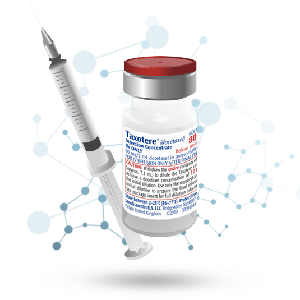Taxotere Lawsuit Overview
 In March 2016, Erma Spann filed the first Taxotere lawsuit against drug manufacturer Sanofi in Illinois Federal Court. The claim says Spann suffered “permanent disfiguring hair loss” after Taxotere breast cancer treatment in 2005. Cancer patients with semi-permanent or permanent hair loss after completing chemotherapy may file a Taxotere lawsuit claim.
In March 2016, Erma Spann filed the first Taxotere lawsuit against drug manufacturer Sanofi in Illinois Federal Court. The claim says Spann suffered “permanent disfiguring hair loss” after Taxotere breast cancer treatment in 2005. Cancer patients with semi-permanent or permanent hair loss after completing chemotherapy may file a Taxotere lawsuit claim.
What Is Taxotere?
Taxotere (docetaxel) is an anti-mitotic chemotherapy medication that interferes with cell division. In addition to breast cancer, it treats non-small cell lung cancer, advanced stomach cancer, head and neck cancer, and metastatic prostate cancer. Injectable chemo drug Taxotere initially won FDA approval to treat adjuvant breast cancer in 2004. Oncologists frequently administer docetaxel combined with other chemotherapy drugs, like doxorubicin and cyclophosphamide.
Taxotere’s Potential Permanent Hair Loss Initially Downplayed
Sanofi marketed Taxotere as a superior chemotherapy for disease-free cancer survival, downplaying possible hair loss risks. Sanofi did mention that “loss of hair occurs in most patients taking Taxotere (including the hair on your head, underarm hair, pubic hair, eyebrows and eyelashes) … after the first few treatments and varies from patient to patient.” However, Sanofi added a reassuring note on timing for eventual hair regrowth: “Once you have completed all your treatments, hair generally grows back.”
And yet the very next side effect, fatigue, says: “A number of patients (about 10%) feel very tired following their treatments … If it is bothersome or lasts for longer than 1 week, inform your doctor or nurse.” So, while patients might infer hair loss was unpleasant, it was probably only temporary. Finally, hair loss reversal should occur shortly after completing cancer treatment.
FDA Updates Taxotere Label to Reflect Permanent Hair Loss Risk
Since Taxotere’s FDA approval, studies found hair loss is more prevalent than originally stated and is also potentially permanent. According to the 2005 GEICAM 9805 trials study, 9.2% of cancer patients given Taxotere reported permanent hair loss. Further, patients reported alopecia symptoms for as long as 10 years and 5 months.
Later in 2010, The National Center for Biotechnology Information released a study on chemotherapy-induced alopecia, noting some cases seemed to stem specifically from Taxotere. Then in 2012, The Journal of Clinical Oncology published a meta-analysis report showing newer cancer drugs like Taxotere could be associated with higher side effect risks, including death. Nevertheless, Taxotere’s warning label wasn’t updated to reflect the risk of permanent hair loss until December 2015. For almost two decades, patients were unaware of the drug’s potential long-term side effect.
Recent Taxotere Lawsuit Information
Following Spann’s Taxotere lawsuit, Ami Dodson filed due to permanent hair loss after finishing chemotherapy in 2010. Dodson’s lawyers accuse Sanofi of engaging in deceptive marketing tactics. Dodson alleges this was done in order to increase Taxotere’s popularity with U.S. health care providers. In addition, Dodson alleges Sanofi intentionally withheld information about the risk of developing alopecia from American consumers. Notably, she claims Sanofi published information in other countries about permanent hair loss risks, but omitted it from U.S. materials.
Judicial Panel Requests Taxotere Lawsuit Consolidation
At least 30 additional Taxotere claims are still pending. Plaintiffs accuse Sanofi of negligence for failing to adequately warn consumers about Taxotere’s permanent baldness risks. Due to stark similarities in Taxotere allegations, the U.S. Judicial Panel on Multidistrict Legislation finally stepped in. On October 4, 2016, the JPML ordered all federal cases consolidated into one class action lawsuit (MDL No. 2740).
Check your eligibility for compensation.
If you or a loved one experienced permanent hair loss after completing Taxotere chemotherapy, you may qualify for compensation from the manufacturer. Request your free case evaluation now to see if you may qualify.




